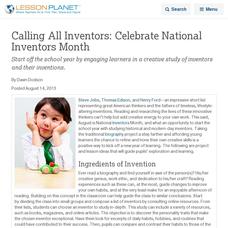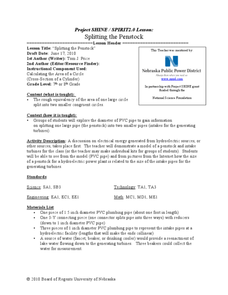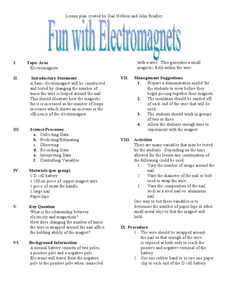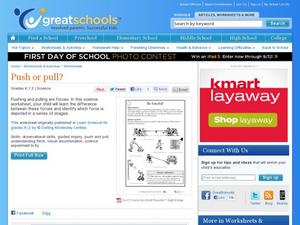Curated OER
Electromagnets
Students conduct a series of experiments on electromagnets. In this physics activity, students build their own electromagnet and explain how it works. They determine the factors that affect its strength.
Curated OER
Primary Energy Sources Pros and Cons
Students explore the different types of renewable and nonrenewable energy sources. In this earth science lesson, students discuss the pros and cons of each type. They conduct a variety of experiments on renewable energy.
Curated OER
Lenz's Law
Students conduct a series of experiments on electromagnetic induction. In this physics lesson, students apply the right hand rule to determine the current direction and electromotive force. They test Lenz's and Faraday's law by observing...
Curated OER
Daniell Cell
Students explain how Daniell cells work. In this electrochemistry lesson, students conduct a variety of experiments to explore the different types of cells. They create a model of Daniell cell.
Curated OER
Magnetic Levitation
Students conduct a series of experiments on magnetic levitation. For this physics lesson, students discover how Maglev trains operate. They explain how magnetism make even simple objects levitate.
Curated OER
Magnetorheological Fluids
Students conduct a series of experiments on magnetorheological fluids. In this physics lesson, students explain how these fluids behave in varying magnetic field strength. They give practical applications of magnetorheological fluids.
Curated OER
Series or Parallel?
Emerging electricians extend mental models of light bulbs and resistors in series and or in parallel circuits to include the connection of photovoltaic cells in arrays. They investigate open circuits, using a DC voltmeter, a light...
Curated OER
Baking Ice Cream
In this science and cooking worksheet, students investigate how it is possible to make a baked ice cream dessert. Students follow the detailed recipe, then answer the questions where they hypothesize why the ice cream did not melt.
Curated OER
On The Light Side
Kindergartners identify different sources of light in a science activity. They view pictures of a flashlight, a match, and a lamp, among others, and color the part of the picture that creates light. A science activity prompts them to...
Curated OER
All Things Science Jeopardy
"Jeopardy"-style PowerPoints are a favorite for students! This resource covers four categories, and has a ????? category as well. The categories are: animal adaptations, sound, electricity, and Earth. The hints are high-level, and this...
Texas State Energy Conservation Office
Investigation: Automotive Emissions and the Greenhouse Effect
It is recommended that you conduct this fabulous experiment as a whole-class demonstration. Collect air samples from the environment, human exhalation, and car exhaust, then compare them for carbon dioxide content using bromthymol blue...
University of Minnesota
Mindflex Activity
Control a ball with your mind! Using a headset with an electrode, learners adjust the movement of a ball. They develop an experiment that tests the involvement of the central nervous system in controlling the ball. The activity helps to...
Science Matters
May the Magnetic Force Be with You
Attraction and repulsive forces might seem mysterious to young learners. Have your classes experiment with these forces in the second installment of a 14-part unit on magnetism and electricity. Individuals test different...
Science Matters
Magnetic Fields: The Earth Acts as a Giant Magnet
Attract learners to an interesting lesson! The third in a 14-part series of lessons on electricity and magnetism uses a hands-on approach to exploring magnetic fields. Scholars experiment with a compass to test Earth's magnetic field and...
Curated OER
Thomas Edison's Inventions in the 1900s and Today: From "New" to You!
Students research types of technology available to Americans at the beginning of the 20th century and compare the style of living to modern times. They identify Thomas Edison's contributions to technology and their own current lifestyles.
Curated OER
Calling All Inventors: Celebrate National Inventors Month
Start off the school year by engaging learners in a creative study of inventors and their inventions.
Curated OER
Name that metal!
Learners have to have had some experience with metals prior to using this worksheet. They are given five properties common to five different metals. They create or use a dichotomous key to identify the five mystery metals. Tip: This...
Curated OER
Industry Based Learning
Students engage in a series of experiences based upon helping them become associated with industry. They participate in work experience based activities in order to create a context for future career choice. Students also complete a...
Curated OER
Energy and Energy Conversion
Third graders investigate different energy conversions through hands-on activities. In this energy instructional activity, 3rd graders move through four stations and conduct experiments illustrating energy conversions. Wave energy,...
Curated OER
Wavelengths of Light
Explore physical science by participating in a visual spectrum experiments. Budding scientists identify the colors in the color spectrum and view the colors in class by utilizing cellophane, flash lights, and other arts and crafts...
Curated OER
Comparing Volumes
Learners conduct experiments to discover the various ratios of oil to popcorn kernels. They determine which amount of oil produced the most popped kernels.
Curated OER
Splitting the Penstock
Students investigate the best way to calculate the measurements of an area. In this geometry lesson, students relate a large circle to a cylinder and its measurements. They use PVC pipes to gain hands on experience as they calculate the...
Curated OER
Fun with Electromagnets
Junior scientists work in groups to construct electromagnets. They experiment by varying number of wraps around the nail, the diameter of the nail, and the type of metal the nail is made of to see if any of these factors has an...
Curated OER
Be forceful!
Didn't some scientist develop rules about force and motion? Youngsters can experience physical science as they determine which picture shows the force of pushing or pulling. Tip: Ask learners if they can think of any unseen forces that...

























